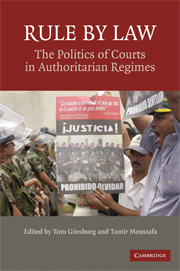Book contents
- Frontmatter
- Contents
- Contributors
- Introduction: The Functions of Courts in Authoritarian Politics
- 1 Of Judges and Generals: Security Courts under Authoritarian Regimes in Argentina, Brazil, and Chile
- 2 Administrative Law and the Judicial Control of Agents in Authoritarian Regimes
- 3 Singapore: The Exception That Proves Rules Matter
- 4 Agents of Anti-Politics: Courts in Pinochet's Chile
- 5 Law and Resistance in Authoritarian States: The Judicialization of Politics in Egypt
- 6 Courts Out of Context: Authoritarian Sources of Judicial Failure in Chile (1973–1990) and Argentina (1976–1983)
- 7 Enforcing the Autocratic Political Order and the Role of Courts: The Case of Mexico
- 8 The Institutional Diffusion of Courts in China: Evidence from Survey Data
- 9 Building Judicial Independence in Semi-Democracies: Uganda and Zimbabwe
- 10 Judicial Power in Authoritarian States: The Russian Experience
- 11 Courts in Semi-Democratic/Authoritarian Regimes: The Judicialization of Turkish (and Iranian) Politics
- 12 Judicial Systems and Economic Development
- 13 Courts in Authoritarian Regimes
- References
- Index
Introduction: The Functions of Courts in Authoritarian Politics
Published online by Cambridge University Press: 05 June 2012
- Frontmatter
- Contents
- Contributors
- Introduction: The Functions of Courts in Authoritarian Politics
- 1 Of Judges and Generals: Security Courts under Authoritarian Regimes in Argentina, Brazil, and Chile
- 2 Administrative Law and the Judicial Control of Agents in Authoritarian Regimes
- 3 Singapore: The Exception That Proves Rules Matter
- 4 Agents of Anti-Politics: Courts in Pinochet's Chile
- 5 Law and Resistance in Authoritarian States: The Judicialization of Politics in Egypt
- 6 Courts Out of Context: Authoritarian Sources of Judicial Failure in Chile (1973–1990) and Argentina (1976–1983)
- 7 Enforcing the Autocratic Political Order and the Role of Courts: The Case of Mexico
- 8 The Institutional Diffusion of Courts in China: Evidence from Survey Data
- 9 Building Judicial Independence in Semi-Democracies: Uganda and Zimbabwe
- 10 Judicial Power in Authoritarian States: The Russian Experience
- 11 Courts in Semi-Democratic/Authoritarian Regimes: The Judicialization of Turkish (and Iranian) Politics
- 12 Judicial Systems and Economic Development
- 13 Courts in Authoritarian Regimes
- References
- Index
Summary
Two decades ago, Martin Shapiro urged public law scholars to expand their horizons and begin studying “any public law other than constitutional law, any court other than the Supreme Court, any public lawmaker other then the judge, and any country other than the United States” (Shapiro 1989). Shapiro recognized that American public law scholarship stood at the margins of political science because it did not adequately engage the broad questions in the field0. Perhaps more importantly, Shapiro recognized that judicial institutions had become important political players in a number of countries and that a “judicialization of politics” was on the advance across much of the world.
Since Shapiro's first call for more comparative scholarship, there has been an explosion in the judicial politics literature focused on a variety of regions and themes, including the role of courts in democratizing countries, the relationship between law and social movements, and the judicialization of international politics. However, there has been relatively little research on the dynamics of judicial politics in non-democracies. This gap in the literature is likely the result of a long-standing presumption among many political scientists that courts in authoritarian regimes serve as mere pawns of their rulers, and that they therefore lack any independent influence in political life. Yet, as many of the contributors to this volume have demonstrated elsewhere (Barros 2002, Hilbink 2007, Moustafa 2007, Pereira 2005, Solomon 1996), the empirical reality in many authoritarian regimes cuts against this conventional wisdom.
- Type
- Chapter
- Information
- Rule by LawThe Politics of Courts in Authoritarian Regimes, pp. 1 - 22Publisher: Cambridge University PressPrint publication year: 2008
- 36
- Cited by



